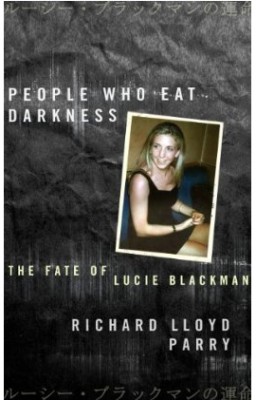Jake has done an honest and intriguing review of journalist Richard Lloyd Parry’s People Who Eat Darkness: The Fate of Lucie Blackman over at Literary Review. Partial transcript below.
 When the disappearance of Lucie Blackman made the news, I was covering it as a reporter for the Yomiuri Shimbun, Japan’s largest newspaper. By necessity rather than by choice, I was already familiar with the darker side of the country: I had spent 1999 to 2000 as a police reporter assigned to the 4th District, home of Japan’s largest adult entertainment area, Kabukicho. Despite being from different papers, Richard Lloyd Parry and I worked the story together, exchanging information, contacts and tips. There was a chance that Lucie might still be alive, being held captive somewhere. The hope that reporting on it might make a difference superseded any journalistic rivalry. Now Parry has written a compelling book about the depravity of man, the difficult pursuit of justice, and how we deal with the wrongful deaths of those whom we loved.
When the disappearance of Lucie Blackman made the news, I was covering it as a reporter for the Yomiuri Shimbun, Japan’s largest newspaper. By necessity rather than by choice, I was already familiar with the darker side of the country: I had spent 1999 to 2000 as a police reporter assigned to the 4th District, home of Japan’s largest adult entertainment area, Kabukicho. Despite being from different papers, Richard Lloyd Parry and I worked the story together, exchanging information, contacts and tips. There was a chance that Lucie might still be alive, being held captive somewhere. The hope that reporting on it might make a difference superseded any journalistic rivalry. Now Parry has written a compelling book about the depravity of man, the difficult pursuit of justice, and how we deal with the wrongful deaths of those whom we loved.
Lucie, a young English woman, came to Japan to have fun and make money as a hostess in order to pay off her debts. She never went home. Her alleged killer, Joji Obara, is a clever man and a graduate of the law department of an elite Japanese university. I write ‘alleged’ because, despite all the circumstantial evidence that he was responsible for her death, the Japanese courts have only convicted him of dismembering her corpse. The charges were of rape resulting in death, but they have not yet been proven to the satisfaction of the judiciary. Obara knows that without a full confession, the Japanese police are handicapped, and prosecutors loathe such a case. He also knew enough of the law to prey on foreign hostesses. Hostessing is not allowed on foreign visas. If foreign hostesses go to the police as victims of sexual assault, they themselves are arrested and often deported, and no charges are generally brought against their assailants. (For years, human traffickers in Japan exploited this same fact.)
Every year, roughly 80,000 people go missing in Japan. The police don’t investigate each disappearance, or even a significant fraction of them. Perhaps if Tim Blackman, Lucie’s father, hadn’t raised hell, the case would never have been seriously investigated. But once the Tokyo Police realised that this was not just another missing persons case, they pursued it with vigour and determination. While the police are generally treated fairly in the book, Parry implies that they were uninterested in the case, and this is not so.
Read the rest at Literary Review.